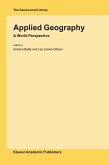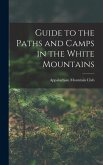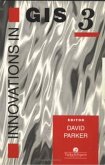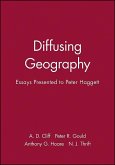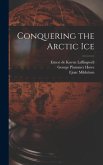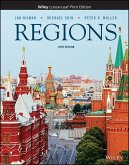Thinking Big Data in Geography
New Regimes, New Research
Herausgeber: Thatcher, Jim; Eckert, Josef; Shears, Andrew
Thinking Big Data in Geography
New Regimes, New Research
Herausgeber: Thatcher, Jim; Eckert, Josef; Shears, Andrew
- Gebundenes Buch
- Merkliste
- Auf die Merkliste
- Bewerten Bewerten
- Teilen
- Produkt teilen
- Produkterinnerung
- Produkterinnerung
Jim Thatcher¿is an assistant professor of geography at the¿University of Washington¿Tacoma. Josef Eckert is an academic advisor for the Master of Library and Information Science program at the University of Washington. Andrew¿Shears¿is an assistant professor of geography at Mansfield University. ¿
Andere Kunden interessierten sich auch für
![Applied Geography Applied Geography]() BaillyApplied Geography187,99 €
BaillyApplied Geography187,99 €![Mountain Environments Mountain Environments]() Romola ParishMountain Environments239,99 €
Romola ParishMountain Environments239,99 €![Guide to the Paths and Camps in the White Mountains Guide to the Paths and Camps in the White Mountains]() Appalachian Mountain ClubGuide to the Paths and Camps in the White Mountains36,99 €
Appalachian Mountain ClubGuide to the Paths and Camps in the White Mountains36,99 €![Innovations In GIS Innovations In GIS]() David Parker (ed.)Innovations In GIS99,99 €
David Parker (ed.)Innovations In GIS99,99 €![Diffusing Geography Diffusing Geography]() Diffusing Geography211,99 €
Diffusing Geography211,99 €![Conquering the Arctic Ice Conquering the Arctic Ice]() Ejnar MikkelsenConquering the Arctic Ice43,99 €
Ejnar MikkelsenConquering the Arctic Ice43,99 €![Geography Geography]() Jan NijmanGeography168,99 €
Jan NijmanGeography168,99 €-
-
-
Jim Thatcher¿is an assistant professor of geography at the¿University of Washington¿Tacoma. Josef Eckert is an academic advisor for the Master of Library and Information Science program at the University of Washington. Andrew¿Shears¿is an assistant professor of geography at Mansfield University. ¿
Hinweis: Dieser Artikel kann nur an eine deutsche Lieferadresse ausgeliefert werden.
Hinweis: Dieser Artikel kann nur an eine deutsche Lieferadresse ausgeliefert werden.
Produktdetails
- Produktdetails
- Verlag: Nebraska
- Seitenzahl: 324
- Erscheinungstermin: 1. April 2018
- Englisch
- Abmessung: 229mm x 152mm x 22mm
- Gewicht: 644g
- ISBN-13: 9780803278820
- ISBN-10: 0803278829
- Artikelnr.: 49958913
- Herstellerkennzeichnung
- Libri GmbH
- Europaallee 1
- 36244 Bad Hersfeld
- gpsr@libri.de
- Verlag: Nebraska
- Seitenzahl: 324
- Erscheinungstermin: 1. April 2018
- Englisch
- Abmessung: 229mm x 152mm x 22mm
- Gewicht: 644g
- ISBN-13: 9780803278820
- ISBN-10: 0803278829
- Artikelnr.: 49958913
- Herstellerkennzeichnung
- Libri GmbH
- Europaallee 1
- 36244 Bad Hersfeld
- gpsr@libri.de
Jim Thatcher is an assistant professor of geography at the University of Washington Tacoma. Josef Eckert is an academic advisor for the Master of Library and Information Science program at the University of Washington. Andrew Shears is an assistant professor of geography at Mansfield University.
List of Illustrations
List of Tables
Introduction
Jim Thatcher, Andrew Shears, and Josef Eckert
Part 1. What Is Big Data and What Does It Mean to Study It?
1. Toward Critical Data Studies: Charting and Unpacking Data Assemblages
and Their Work
Rob Kitchin and Tracey P. Lauriault
2. Big Data: Why (Oh Why?) This Computational Social Science?
David O’Sullivan
Part 2. Methods and Praxis in Big Data Research
3. Smaller and Slower Data in an Era of Big Data
Renee Sieber and Matthew Tenney
4. Reflexivity, Positionality, and Rigor in the Context of Big Data
Research
Britta Ricker
Part 3. Empirical Interventions
5. A Hybrid Approach to Geotweets: Reading and Mapping Tweet Contexts on
Marijuana Legalization and Same-Sex Marriage in Seattle, Washington
Jin-Kyu Jung and Jungyeop Shin
6. Geosocial Footprints and Geoprivacy Concerns
Christopher D. Weidemann, Jennifer N. Swift, and Karen K. Kemp
7. Foursquare in the City of Fountains: Using Kansas City as a Case Study
for Combining Demographic and Social Media Data
Emily Fekete
Part 4. Urban Big Data: Urban-Centric and Uneven
8. Big City, Big Data: Four Vignettes
Jessa Lingel
9. Framing Digital Exclusion in Technologically Mediated Urban Spaces
Matthew Kelley
Part 5. Talking across Borders
10. Bringing the Big Data of Climate Change Down to Human Scale: Citizen
Sensors and Personalized Visualizations in Climate Communication
David Retchless
11. Synergizing Geoweb and Digital Humanitarian Research
Ryan Burns
Part 6. Conclusions
12. Rethinking the Geoweb and Big Data: Future Research Directions
Mark Graham
Bibliography
List of Contributors
Index
List of Tables
Introduction
Jim Thatcher, Andrew Shears, and Josef Eckert
Part 1. What Is Big Data and What Does It Mean to Study It?
1. Toward Critical Data Studies: Charting and Unpacking Data Assemblages
and Their Work
Rob Kitchin and Tracey P. Lauriault
2. Big Data: Why (Oh Why?) This Computational Social Science?
David O’Sullivan
Part 2. Methods and Praxis in Big Data Research
3. Smaller and Slower Data in an Era of Big Data
Renee Sieber and Matthew Tenney
4. Reflexivity, Positionality, and Rigor in the Context of Big Data
Research
Britta Ricker
Part 3. Empirical Interventions
5. A Hybrid Approach to Geotweets: Reading and Mapping Tweet Contexts on
Marijuana Legalization and Same-Sex Marriage in Seattle, Washington
Jin-Kyu Jung and Jungyeop Shin
6. Geosocial Footprints and Geoprivacy Concerns
Christopher D. Weidemann, Jennifer N. Swift, and Karen K. Kemp
7. Foursquare in the City of Fountains: Using Kansas City as a Case Study
for Combining Demographic and Social Media Data
Emily Fekete
Part 4. Urban Big Data: Urban-Centric and Uneven
8. Big City, Big Data: Four Vignettes
Jessa Lingel
9. Framing Digital Exclusion in Technologically Mediated Urban Spaces
Matthew Kelley
Part 5. Talking across Borders
10. Bringing the Big Data of Climate Change Down to Human Scale: Citizen
Sensors and Personalized Visualizations in Climate Communication
David Retchless
11. Synergizing Geoweb and Digital Humanitarian Research
Ryan Burns
Part 6. Conclusions
12. Rethinking the Geoweb and Big Data: Future Research Directions
Mark Graham
Bibliography
List of Contributors
Index
List of Illustrations
List of Tables
Introduction
Jim Thatcher, Andrew Shears, and Josef Eckert
Part 1. What Is Big Data and What Does It Mean to Study It?
1. Toward Critical Data Studies: Charting and Unpacking Data Assemblages
and Their Work
Rob Kitchin and Tracey P. Lauriault
2. Big Data: Why (Oh Why?) This Computational Social Science?
David O’Sullivan
Part 2. Methods and Praxis in Big Data Research
3. Smaller and Slower Data in an Era of Big Data
Renee Sieber and Matthew Tenney
4. Reflexivity, Positionality, and Rigor in the Context of Big Data
Research
Britta Ricker
Part 3. Empirical Interventions
5. A Hybrid Approach to Geotweets: Reading and Mapping Tweet Contexts on
Marijuana Legalization and Same-Sex Marriage in Seattle, Washington
Jin-Kyu Jung and Jungyeop Shin
6. Geosocial Footprints and Geoprivacy Concerns
Christopher D. Weidemann, Jennifer N. Swift, and Karen K. Kemp
7. Foursquare in the City of Fountains: Using Kansas City as a Case Study
for Combining Demographic and Social Media Data
Emily Fekete
Part 4. Urban Big Data: Urban-Centric and Uneven
8. Big City, Big Data: Four Vignettes
Jessa Lingel
9. Framing Digital Exclusion in Technologically Mediated Urban Spaces
Matthew Kelley
Part 5. Talking across Borders
10. Bringing the Big Data of Climate Change Down to Human Scale: Citizen
Sensors and Personalized Visualizations in Climate Communication
David Retchless
11. Synergizing Geoweb and Digital Humanitarian Research
Ryan Burns
Part 6. Conclusions
12. Rethinking the Geoweb and Big Data: Future Research Directions
Mark Graham
Bibliography
List of Contributors
Index
List of Tables
Introduction
Jim Thatcher, Andrew Shears, and Josef Eckert
Part 1. What Is Big Data and What Does It Mean to Study It?
1. Toward Critical Data Studies: Charting and Unpacking Data Assemblages
and Their Work
Rob Kitchin and Tracey P. Lauriault
2. Big Data: Why (Oh Why?) This Computational Social Science?
David O’Sullivan
Part 2. Methods and Praxis in Big Data Research
3. Smaller and Slower Data in an Era of Big Data
Renee Sieber and Matthew Tenney
4. Reflexivity, Positionality, and Rigor in the Context of Big Data
Research
Britta Ricker
Part 3. Empirical Interventions
5. A Hybrid Approach to Geotweets: Reading and Mapping Tweet Contexts on
Marijuana Legalization and Same-Sex Marriage in Seattle, Washington
Jin-Kyu Jung and Jungyeop Shin
6. Geosocial Footprints and Geoprivacy Concerns
Christopher D. Weidemann, Jennifer N. Swift, and Karen K. Kemp
7. Foursquare in the City of Fountains: Using Kansas City as a Case Study
for Combining Demographic and Social Media Data
Emily Fekete
Part 4. Urban Big Data: Urban-Centric and Uneven
8. Big City, Big Data: Four Vignettes
Jessa Lingel
9. Framing Digital Exclusion in Technologically Mediated Urban Spaces
Matthew Kelley
Part 5. Talking across Borders
10. Bringing the Big Data of Climate Change Down to Human Scale: Citizen
Sensors and Personalized Visualizations in Climate Communication
David Retchless
11. Synergizing Geoweb and Digital Humanitarian Research
Ryan Burns
Part 6. Conclusions
12. Rethinking the Geoweb and Big Data: Future Research Directions
Mark Graham
Bibliography
List of Contributors
Index


